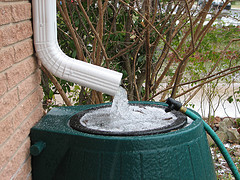 I’m pretty sick of green groups singling out Wal-Mart like the poster child of big, bad, corporate, exploitation bullies. Green people for years talked about the big consumerism and Wal-Mart monster that appealed to that mass consumerism and a throw-away society. Liberal people snub Wal-Mart for its employment practices. Wealthy people snub Wal-Mart because they’d rather shop at Whole Paycheck. Don’t get me wrong, there is a little truth to all these statements. But, I’ve also noticed there are many things that Wal-Mart does right.
I’m pretty sick of green groups singling out Wal-Mart like the poster child of big, bad, corporate, exploitation bullies. Green people for years talked about the big consumerism and Wal-Mart monster that appealed to that mass consumerism and a throw-away society. Liberal people snub Wal-Mart for its employment practices. Wealthy people snub Wal-Mart because they’d rather shop at Whole Paycheck. Don’t get me wrong, there is a little truth to all these statements. But, I’ve also noticed there are many things that Wal-Mart does right.
For instance, they hired Adam Werbach to help them become more environmentally friendly. Mr. Werbach had spent 17 years before that working on environmental activism through his leadership in the Sierra Club and other notable environmental organizations. Shortly after that Wal-Mart started offering the new CFL light bulbs and organic food.
The fact that Wal-Mart does provide employment for many people shouldn’t be overlooked either, in an economy that is hemorrhaging jobs everywhere. While I’m not keen on some of their noted unfair practices, the fact is – a job is a job. You get paid and it helps put food on the table for your family. That’s a HUGE benefit these days.
Now, another fellow blogger is noticing that Wal-Mart is also starting to not offer products that consumers are finding to be to be unsafe, like items that are products like baby bottles and infant formula cans that have a chemical called BPA. This chemical is approved by the FDA, but consumers are much more aware these days that not everything that’s on a store shelf is safe – no matter what government agency approves it. So, now Wal-Mart is being attacked for usurping the role of the FDA. It’s never ending the kind of criticism this company gets.
And, no one remembers that it was Wal-Mart’s beautifully efficient distribution system that ended being the most help in getting needed items into the New Orleans area during Hurricane Katrina, before and after the storm.
Honestly, I like Wal-Mart and I think they are doing many things right and are willing to change and evolve as they learn what works in our capitalistic economy and what doesn’t. It doesn’t hurt either that your money goes a whole lot further with the groceries there than other supermarkets too.


